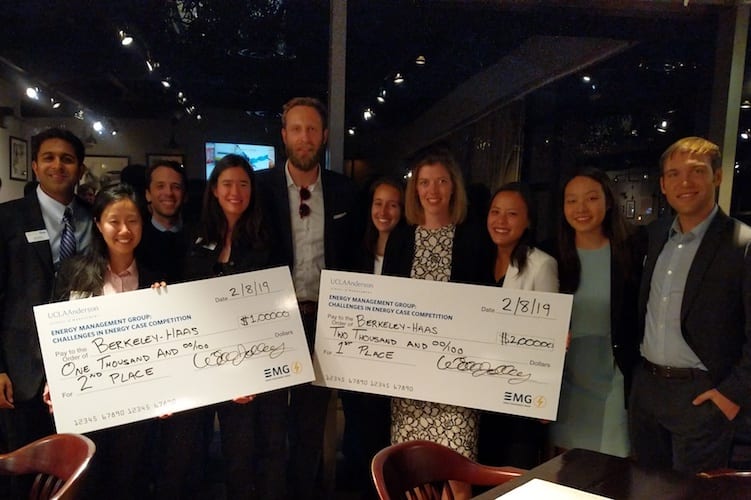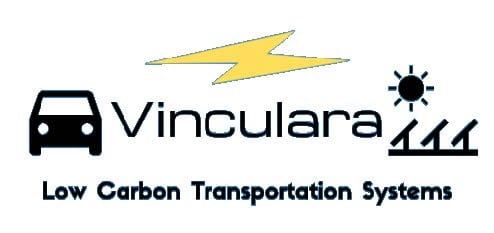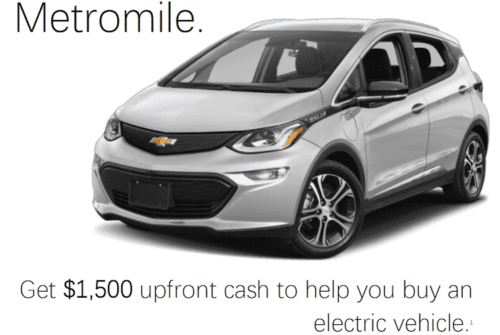
The two teams: (L-R:) Sid Mullick, Cici Saekow, Mark Sheiness, Kylie Sale, William Lynn (from Edison International/Southern California Edison), Bree Soares, Kate Tomlinson, Joyce Yao, Deborah Tan, and Nick Matcheck, all MBA 20.
The Win: 1st and 2nd place at UCLA’s 6th Annual Challenges in Energy Case Competition Feb. 8-10.
The Field: Seven teams competed from across the country in the case called, “Pedal to the medal: Southern California’s transportation roadmap timed with the 2028 Olympics.” Haas sent two teams—Team Metromile and Team Vinculara—that went to the finals this year, competing for $5,000 in cash prize money.
The Case: Teams were challenged to answer the following question: With Southern California leading the transformation to electrify the transportation sector, where is the money to be made, and how can I get my company involved? Teams could position themselves anywhere in the electric transportation supply chain—as either a new company or an existing player in the market. The case needed to support the zero-emissions 2018 roadmap and the electrification of California’s transportation sector.
A little background: Los Angeles is hosting the summer 2028 Olympic games. As the city prepares, the LA Cleantech Incubator is partnering with local government and businesses, including Southern California Edison, to speed up the region’s move toward transportation electrification. The partnership’s members have agreed to go beyond California’s goals for emissions and pollution reduction before the games begin by targeting an additional 25 percent reduction in greenhouse gases and air pollution—by accelerating transportation electrification.
The pitch from Team Vinculara (first place): (Nick Matcheck, Bree Soares, Kate Tomlinson, Deb Tan, Joyce Yao) Vinculara proposed a blockchain-based platform that would provide a more efficient and effective allocation of the state-regulated Low Carbon Fuel Standard (LCFS) credits to electric vehicle fleet owners. The idea came from team member Kate Tomlinson, a business consultant for Blockchain at Berkeley, who is researching the use of blockchain in the energy industry. The problem they addressed? Electric vehicle owners are compensated for avoiding carbon emissions  though the Clean Fuel Reward Program run by utilities, but the current tracking system is costly and inaccurate and does not incentivize enough behavior change. “Blockchain helps to reduce a lot of back-end inefficiencies,” Yao said. Vinculara’s blockchain platform, when used by electric vehicle owners, fleet managers, and regulators, would help reduce the cost and complexity of tracking and verifying credits and in doing so, open up the LCFS market to smaller players who are currently unable to get involved and claim their credits. “I think the market-opening part is the most interesting part of our proposal,” Tomlinson said.
though the Clean Fuel Reward Program run by utilities, but the current tracking system is costly and inaccurate and does not incentivize enough behavior change. “Blockchain helps to reduce a lot of back-end inefficiencies,” Yao said. Vinculara’s blockchain platform, when used by electric vehicle owners, fleet managers, and regulators, would help reduce the cost and complexity of tracking and verifying credits and in doing so, open up the LCFS market to smaller players who are currently unable to get involved and claim their credits. “I think the market-opening part is the most interesting part of our proposal,” Tomlinson said.
The pitch from Team Metromile (second place): (Sid Mullick, Cici Saekow, Mark Sheiness, and Kylie Sale) The team proposed combining Metromile’s per-mile auto insurance program with a calculated cash advance to accelerate adoption of electric vehicles, while simultaneously transforming the company’s potential to become a preferred provider of auto insurance among electric vehicle owners. Traditional cash incentive programs rely on fuel savings, which take several years to recover. This proposal leverages per-mile calculated auto insurance, with a three-year insurance subscription to deliver immediate electric vehicle savings to potential customers up front, thereby converting on-the-fence customers into EV adopters.

On seeing double at the final: “All the teams worked really hard and we were honored to be chosen as finalists,” Saekow said. “When the judges announced that both first and second teams went to Haas, I felt especially proud to share the stage with my classmates.”